Diet Plan for Third Trimester of Pregnancy
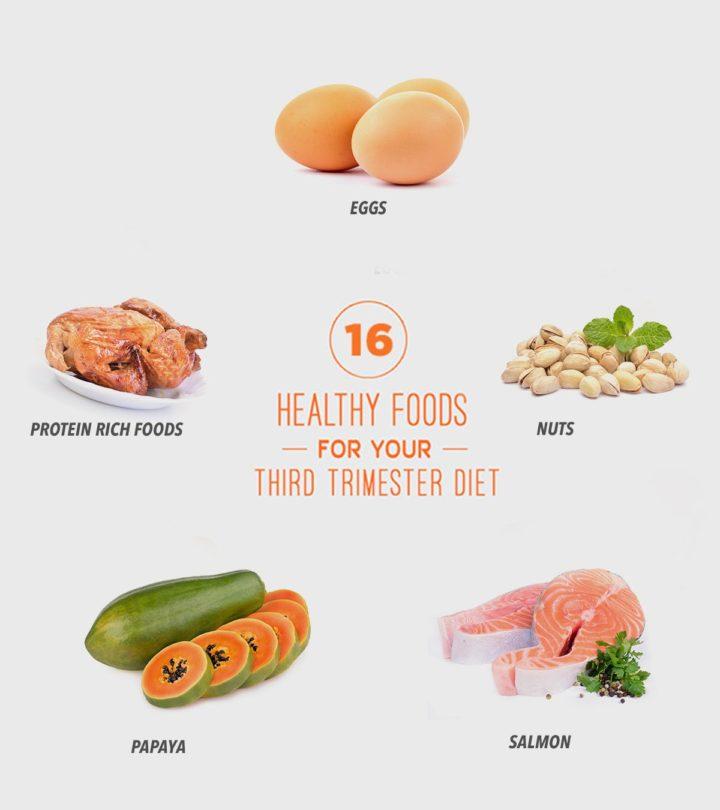
Don't eat for two but eat healthy. This is what you are told when you are pregnant. Gone are the days when women were advised to eat for two. The latest focus is on what we eat rather than how much we eat, especially as your pregnancy progresses.
The third trimester of pregnancy starts in the 28th week and extends till delivery. During this time, you need sufficient energy to keep up with the routines throughout the day. Rely on the right diet so that you and your baby get all the required nutrition.
MomJunction helps you understand the foods that need to be a part of your third-trimester pregnancy diet. But before that, let's understand the nutritional requirements in this trimester.
Nutritional Requirements In Third Trimester
During the trimester, you need an additional 500 calories a day (1) to your basic caloric and protein needs. Here are the other nutrient details:
- DHA is important for proper development of the fetal brain and retina during the third trimester. Its requirement increases from 100 to 200mg per day.
- You need a daily dose of 1,000mg calcium, which is essential to build bones and teeth in your baby. Milk and other dairy products, such as cheese and yogurt, are the best sources of calcium.
- Vitamin D is needed for the bones to absorb calcium. You would need 15 µg per day.
- With the progressing pregnancy, the iron requirement for fetal growth rises in proportion to the weight of the fetus, with most of the iron accumulating during the third trimester (2). You would need 27mg of it every day.
- Folic acid is essential to avoid neural defects in the baby. Your intake can go up to 800µg per day.
- You need additional 26g a day of protein in the third trimester as it is required to maintain maternal tissues and fetal growth.
[ Read: Nutritious Fruits During Pregnancy ]
Now that you know the amounts of nutrients you need, let's go into your diet plan.
Third trimester diet chart
| Magnesium rich foods | Dark green leafy vegetables, nuts, whole grains, avocados |
| Protein rich foods | Eggs, milk, yogurt, tofu, all meats |
| Calcium rich foods | Broccoli, watercress, cheese, seafood, dried peas, and beans |
| Folic acid rich foods | Lentils, beans, Brussels sprouts, oranges, eggs |
| Iron rich foods | Breads and pastas, beans, beets, raspberries, strawberries, red meat, dry fruits like apricots, prunes |
Foods You Should Have During The Third Trimester
Here is a list of the best foods to eat in the third trimester:
1. Fruits:

Image: iStock
Fresh fruits are rich in vitamin C and play a vital role in the development and proper functioning of the placenta. The vitamin absorbs iron from the food and helps in maintaining a strong immune system (3).In your third trimester, you must take fresh fruits such as kiwis, strawberries, banana, and melon (4). If you are working, then pack the fruit slices for your snacks and eat them during breaks.
2. Lentils:


Image: iStock
These are rich in thiamine (vitamin B1) and fiber (5). You can make soup, porridge (dal), or stew with cooked lentils and have it in your meals.
3. Ham and vegetable salad:
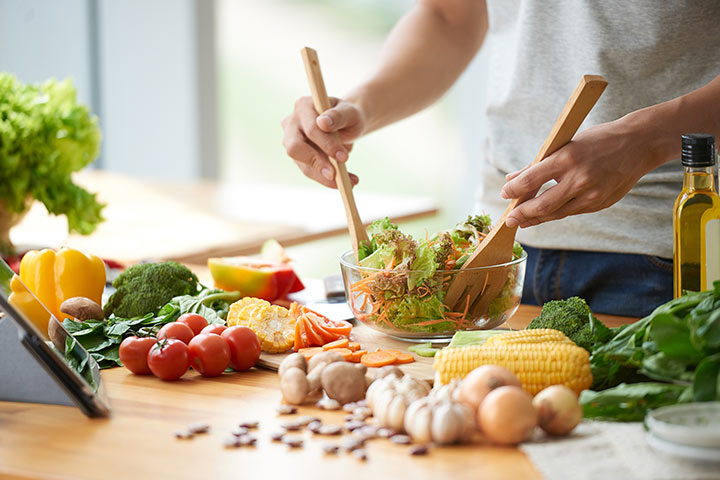
Image: iStock
Vegetables are a rich source of vitamins and ham is a thiamine booster that helps release energy from the food. A salad of radishes, tomatoes, lettuce, and sweet corn, along with thin slices of ham, is an excellent inclusion in your diet during the third trimester.
4. Seeds and nuts:
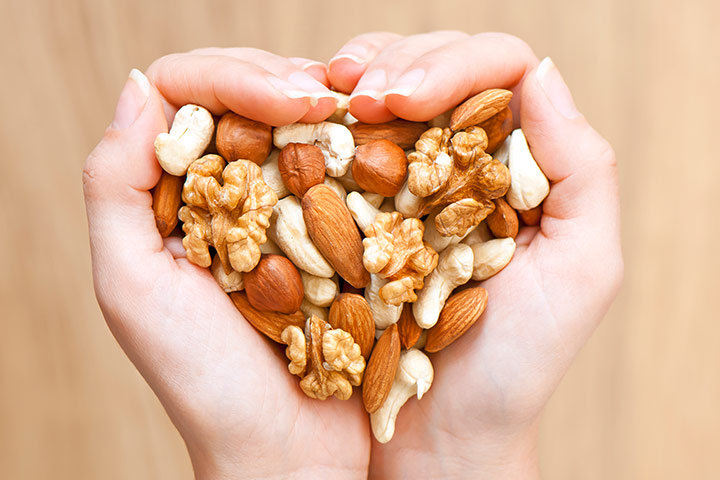
Image: iStock
Munching on seeds and nuts will provide you with sufficient amounts of thiamine, essential omega-3 fatty acids, and proteins (6). You can snack on sunflower seeds and dry fruits such as hazelnuts, almonds, and walnuts added to your breakfast cereals and cereal bars.
5. Wholemeal toast with baked beans:
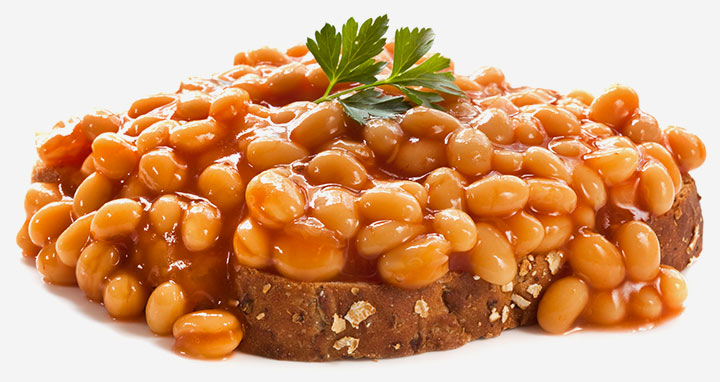
Image: iStock
Wholemeal toast with baked beans is rich in thiamine and fiber that help keep up your energy level throughout the day and prevent constipation.
6. Bacon sandwich:
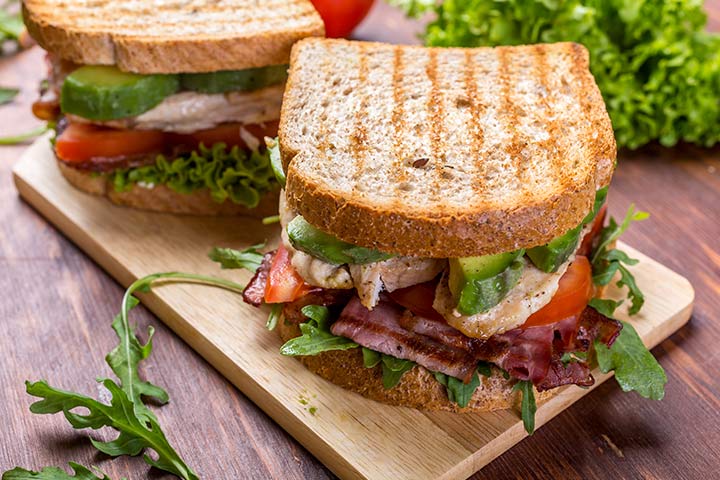
Image: iStock
It is a power pack of thiamine and vitamin C. Make a sandwich with thinly sliced and grilled lean bacon, sliced tomatoes and fresh granary bread, and you will simply love the taste.
7. Avocado salad:
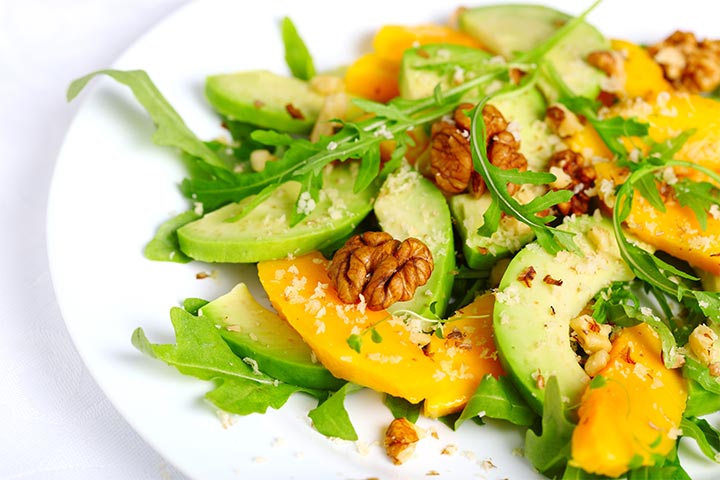
Image: iStock
Avocado is rich in vitamin C, E, and fiber (7). Mix avocado slices with walnuts, watercress, and fruits like mango or orange and add flavorings of your choice.
8. Brussels sprouts:
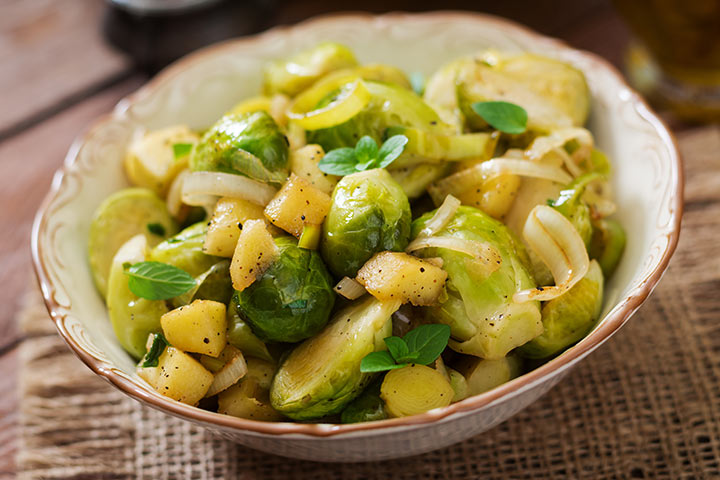
Image: iStock
They are rich in vitamin C and K (8) and make a good side-dish for your meals. It can either be steamed or microwaved until cooked or stir fried with spring onions, garlic, and ginger.
[ Read: 3rd Month Pregnancy Diet ]
9. Salmon:

Image: iStock
The third trimester is associated with the brain development of your baby. Salmon fish is a good source of omega-3 fatty acids and DHA, which is important for the development of your baby's nervous system. However, you can have salmon in limited quantities and only if it is properly cooked. Go for home-made salmon.
10. Eggs:

Image: iStock
Eggs are a good source of choline, which helps in proper functioning of cells and in the rapid development of the baby. Choline aids in memory development and reduces the risk of renal and pancreatic disorders. You can have a thoroughly boiled egg in your breakfast.
12. Ripened papaya:
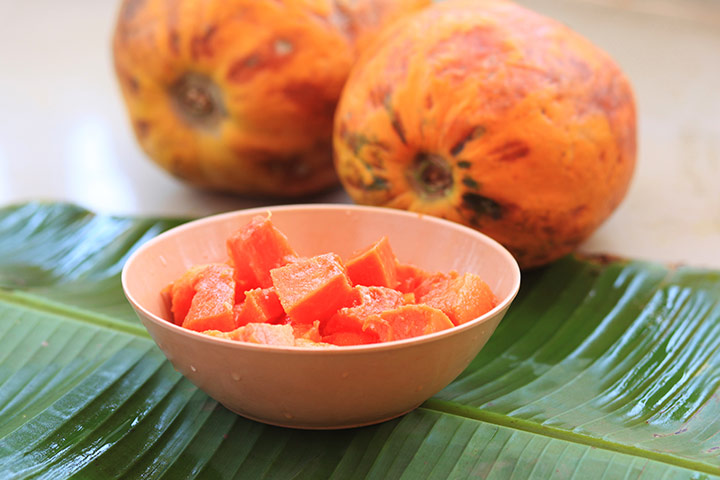
Image: iStock
It is a good source of vitamin C, fiber, potassium, and folate (9). It also helps in preventing heartburns that are common during the third trimester. However, do not eat unripe papaya because it contains pepsin, which can induce contractions and early labor.
13. Green smoothies:
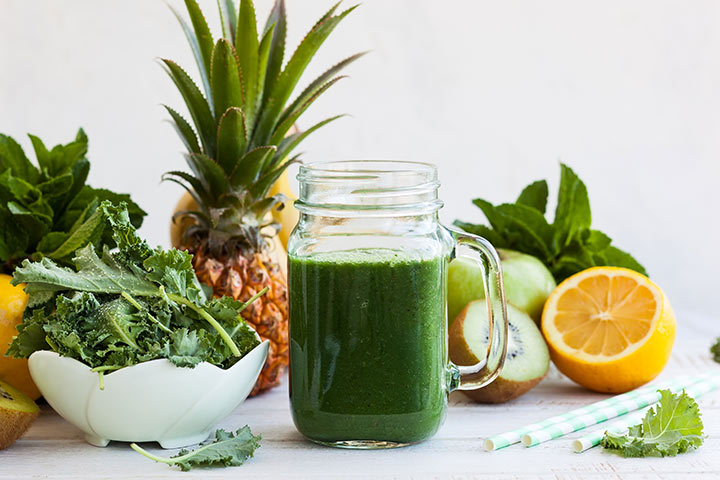
Image: iStock
Green smoothies are a rich source of fiber, calcium, vitamin B6, magnesium, and potassium (10). A blend of baby spinach or kale with ice makes an excellent green smoothie. You can use coconut water and add other ingredients like berries, pineapple, orange, mango, mint or ginger to enhance the taste of the smoothie.
14. Milk and milk products:
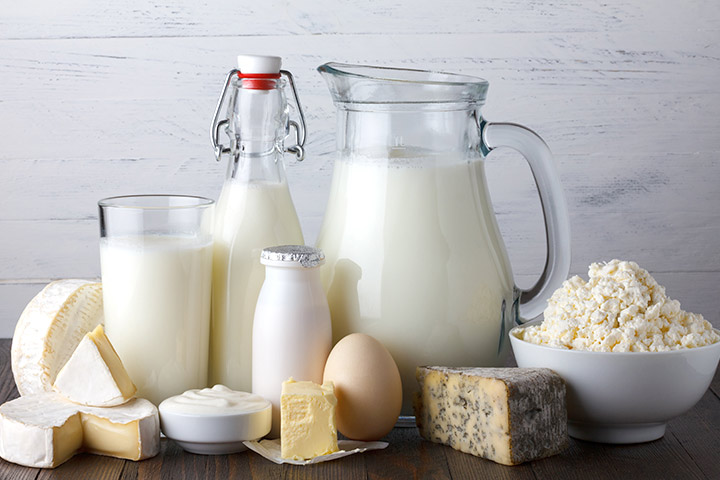
Image: iStock
These are rich sources of calcium. By the third trimester, your calcium requirement increases (11). Milk and milk products along with calcium supplements as prescribed by the doctor will help you meet the requirement.
15. Iron-rich foods:
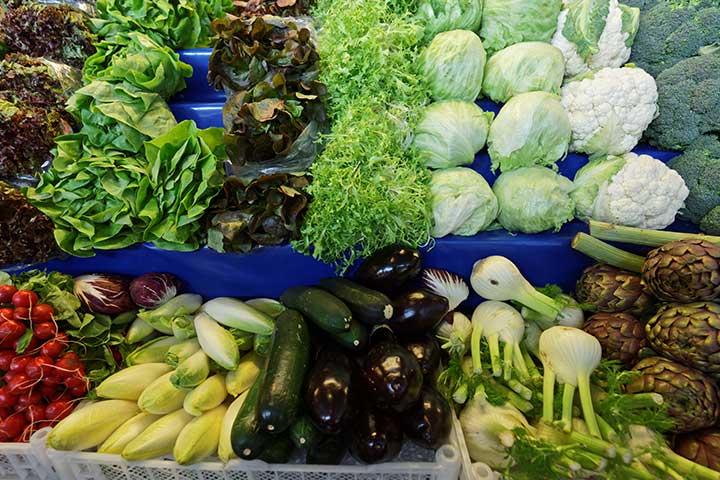

Image: iStock
Green leafy vegetables, broccoli, lean beef, and pork are rich in iron. Iron is necessary for the increased supply of blood to the placenta during the third trimester (12).
16. Folic acid-rich diet:
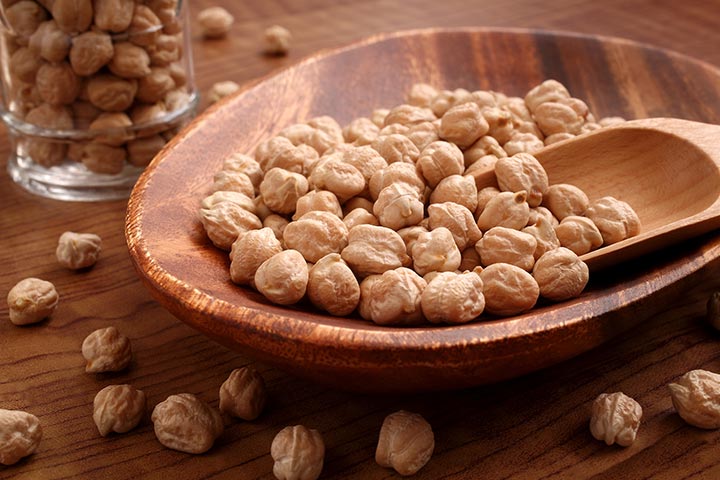
Image: iStock
Folic acid prevents neural tube defects in the developing baby (13). Bread, yeast, beans, chickpeas, and green leafy vegetables like spinach are all a good source of folic acid.
Now you know there is a long list of foods that you need to cover during the third trimester. It could be exhausting to remember and eat each food unless you have a plan in place.
Third Trimester Diet Plan
Here is an example of a diet plan. You may follow this or change it to suit your requirements in such a way that you get the required calories and all the essential nutrients.
[ Read: Protein Rich Foods During Pregnancy ]
| Food items | Daily servings |
|---|---|
| For breakfast: | |
| Broccoli parmesan cheese omelet | 1 serving = 407 calories |
| Whole wheat toast with butter 1 slice toast with 1 tsp butter | 1 serving =125 calories |
| Orange juice (100ml) fortified with vitamin C and calcium | 1 serving =42 calories |
| For snacks: | |
| Mango (1 cup) It is rich in protein, vitamin C and folate. | 1 serving = 100 calories |
| Apricots and walnuts Rich in proteins. | Apricot (1/2 cup) = 37calories Walnuts ( 1 cup) = 173 calories |
| For lunch: | |
| Salmon salad sandwich Fill a pita with salmon and green vegetables. It gives you a good shot of sodium and protein. | 1 serving = 422 calories |
| Soy crisps A good source of protein and fiber. | 1 serving = 140 calories |
| Cantaloupe (1/4 th of melon) It is rich in vitamins A and C. | 1 serving = 50 calories |
| For snacks: | |
| Vegetables (carrots, broccoli or bell peppers with 2 tablespoons hummus) | 1 cup veggies = 121 calories |
| For dinner: | |
| Sauteed halibut (fish) | 1 serving (204 gm) = 379 calories |
| Wild rice It is rich in protein and fat. | 1 cup = 166 calories |
| For dessert: | |
| Skimmed milk, fortified with calcium. | 8-ounce serving = 80 calories |
The diet plan makes your food goals simple, right? Add a few food tips to it, and you are good to close your pregnancy on a healthy note:
Healthy Diet Tips To Follow During The Third Trimester
Here are a few diet tips that you can follow:
- Have small and frequent meals and never skip a meal.
- Include all healthy food groups in your daily diet.
- Drink lots of fluids to avoid dehydration and constipation.
- Cut down on caffeinated beverages.
- Quit smoking and eliminate alcohol.
- Avoid foods that are high in salt, sugar, and fat. Consumption of excess salt can lead to water retention and ankle swellings.
- Avoid swordfish, shark, white snapper fish, or mackerel because they are high in mercury content.
- Do not consume unpasteurized milk.
- Avoid spicy, greasy, and fried foods to prevent indigestion and heartburns.
If you have been eating healthy, continue with the good work. If not, then it is never too late to switch to these nutriments to develop a healthy baby inside your womb. Eating healthy food is the best thing you can do for you and your baby.
However, before you chalk out a diet plan for yourself, consult your gynecologist, who can advise you based on your health needs. Try out new recipes at home for a delicious and healthy meal.
[ Read: Walnuts During Pregnancy ]
Do you have a menu to share? Let us know in the comment box below.
Recommended Articles:
- Health Benefits Of Apricots During Pregnancy
- Foods To Avoid During Pregnancy
- Is It Safe To Eat Papaya During Pregnancy?
- Is It Safe To Eat Pizza During Pregnancy?
The following two tabs change content below.
- Reviewer
- Author

Jyoti Benjamin has 25 years of experience as a clinical dietitian and currently works in Seattle. She focuses on teaching people the value of good nutrition and helping them lead healthy lives by natural means. Benjamin has a masters in Foods and Nutrition, and has been a longtime member and Fellow of AND (Academy of Nutrition and Dietetics) and the... more
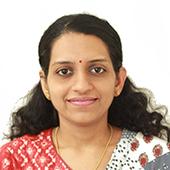
Shreeja holds a postgraduate degree in Chemistry and diploma in Drug Regulatory Affairs. Before joining MomJunction, she worked as a research analyst with a leading multinational pharmaceutical company. Her interest in the field of medical research has developed her passion for writing research-based articles. As a writer, she aims at providing informative articles on health and pharma, especially related to... more
Diet Plan for Third Trimester of Pregnancy
Source: https://www.momjunction.com/articles/healthy-foods-for-your-third-trimester-diet_00109586/